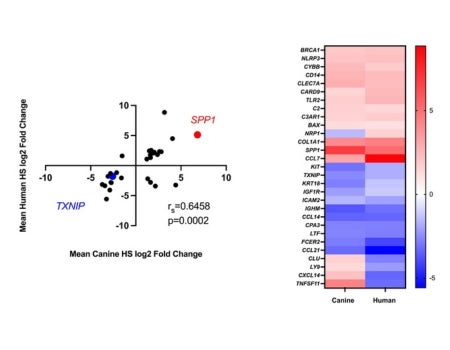Atherton Laboratory
Our Research
We are interested in defining the prognostic and therapeutic role of T cells in hematologic malignancies utilizing a multispecies comparative approach. Our research involves identification and appraisal of novel strategies for T cell-based immunotherapy in clinical trials of canine cancer patients with tumors bearing translational importance for human medicine.
Clinical Trials
Evaluation of Bendamustine as a Novel Chemotherapy Agent for Relapsed Canine Lymphoma
Bendamustine is a chemotherapy drug that is used to treat various types of cancer in people, including lymphoma, but it has not yet been evaluated in dogs with cancer. The purpose of this study is to assess different doses of bendamustine in dogs with lymphoma in order to establish its safety and activity. Dogs will be actively enrolled in the trial for 21 days, consisting of six study visits and two doses of bendamustine. All standard of care tests and procedures and all study-related procedures performed during study visits one through six will be paid for by the study
For more information, please call the study coordinator at (215) 573-6610 or email vcic@vet.upenn.edu.
News and Publications
June 7, 2024 | Katie Bardales received ACVIM Resident Research Award for presenting the lab’s studies of the transcriptional immune microenvironment in canine mast cell tumors in Minneapolis. Congratulations Katie!
June 6, 2024 | Matt Atherton received a travel award for presenting the lab’s comparative studies of osteopontin in histiocytic sarcoma at the 6th International Conference on Cytokines in Cancer in Greece.
May 23, 2024 | The Atherton Lab welcomes new members Dr. Lang Jiang and Lizzy Fiepke!
July 19, 2024 | Philadelphia Inquirer featured Penn Vet’s canine cancer research
July 5, 2023 | Brandon Peng Joins the Atherton Lab — welcome Brandon!
Bardales K.L.*, Jiang L.*, Radaelli E., Assenmacher C.A. Lenz J.A., & Atherton M.J. Intertumoral heterogeneity of the immune microenvironment in high grade canine mast cell tumors. Veterinary Oncology. March 2025. *Contributed equally.
Lenz J.A. & Atherton M.J. Maximising the dual benefit of pet dogs in cancer trials. Nature Reviews Cancer. March 2025.
Lenz J.A., Peng B., Assenmacher C.A., King A., Zhang P.J., Maki R.G., Blanco M.A., Radaelli E., & Atherton M.J. Identification of immune suppressor candidates utilizing comparative transcriptional profiling in histiocytic sarcoma. Cancer Immunology, Immunotherapy. January 2025.
Applications and opportunities for immune cell CAR engineering in comparative oncology. Rotolo A. & Atherton M.J. Clinical Cancer Research. June 2024.
Malignant transformation and subsequent leptomeningeal carcinomatosis of a canine gastric polyp in a dog. Didehvar D., Lanza M., Atherton M.J. & Lenz J.A. Journal of Veterinary Internal Medicine. May/June 2024.
Quantification of CD3, FoxP3, and granzyme B immunostaining in canine renal cell carcinoma. Cournoyer A., Amerman H., Assenmacher C.A., Durham A., Perry J.A., Gedney A., Keuler N., Atherton M.J. & Lenz J.A. Veterinary Immunology and Immunopathology. May 2024.
Unedited allogeneic NKT cells show extended persistence in MHC-mismatched canine recipients. Rotolo A., Whelan E. C., Atherton M. J., Kulikovskaya I., Jarocha D., Fraietta J.A., Kim M. M., Diffenderfer E. S., Cengel K. A., Piviani M., Radaelli E., Duran-Struuck R., & Mason N. J. Cell Reports Medicine. October 2023.
Evaluation of mechlorethamine, vinblastine, procarbazine, and prednisone (MVPP) for the treatment of resistant multicentric canine lymphoma. Zimmerman K., Walsh K.A., Ferrari J.T., Keuler N.S., Atherton, M.J. & Lenz J.A. Veterinary and Comparative Oncology. September 2023.

Director, Atherton Laboratory
Matthew J. Atherton, BVSc, PhD
Assistant Professor of Immuno-Oncology
Work with Us
We are always seeking highly motivated students and scholars interested in identifying and appraising the novel strategies for T cell-based immunotherapy in clinical trials of canine cancer patients.

Please contact us with your background and CV.
Find Us
University of Pennsylvania
School of Veterinary Medicine
3800 Spruce Street
Philadelphia, PA 19104
Our Team

Dillon Didehvar, VMD

Lizzy Fiepke

Lang Jiang

Brandon Peng

Laurel Upton, DVM
Lab Alumni
- Katie Bardales, DVM DACVIM (Oncology) (Veterinary Oncologist)

